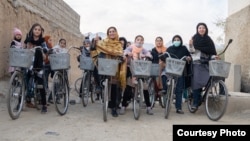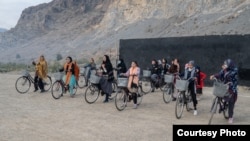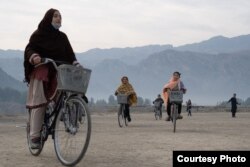A women's bicycling camp in northwest Pakistan drew national attention this week when one of the country’s leading religious political parties, Jamaat-e-Islami (JI), objected to the event, calling it vulgar and a threat to religion and local culture.
The camp, organized by Samar Khan, a well-known Pakistani cyclist and international adventurer, provided girls and women with bicycles and training to encourage more people to take up the sport.
“The objective of this rally was to make aware and educate girls on the benefits of cycling, sports careers and eco-friendly transport. Also, how they can be a part of development if they are not given opportunities?” Khan told VOA’s Deewa Service.
The local chapter of Jamaat-e-Islami, a conservative religious party with influence in Pakistan, Bangladesh, India and Afghanistan, rallied against the camp, held in Landi Kotal, Khyber Pakhtunkhwa, and accused it of promoting a foreign agenda.
“We will not let such indecent activities take place in our area which would threaten our religion and culture. This was a Western agenda applied in Landi Kotal,” Muqtader Shah, a local JI leader, told VOA.
Why un-Islamic?
Another camp organizer, Jamaima Afridi, told VOA she rejected the idea that the camp promoted foreign values.
“Why is it seen as un-Islamic activity? All the girls were dressed culturally and wearing hijabs,” she said.
Religious conservatives have not detailed their objections to the bicycling camp, but organizers suggest it likely has to do with outdated ideas about protecting symbols of female virginity.
“When most developed countries are enjoying the benefits of cycling and sports, creating healthy spaces and infrastructure for their communities, we are debating whether it breaks the hymen of a woman?” Khan told VOA.
Another local organizer of the camp, Jamaima Afridi, said learning sports is equally important for girls and boys in the development of strong bodies, and the girls at the camp clearly appreciated being there.
“The moment when the girls received their first bikes and experienced the joy, freedom and fun associated with it was beautiful. Their faces could tell the story,” said Jamaima.
Khan said cycling can help solve practical issues important to people in the valley, such as promoting better health, reducing people’s daily commute and curbing pollution. But local attitudes could remain a challenge.
Much like in neighboring Afghanistan, many people living in Landi Kotal hold conservative views on gender norms. However, the region for many years has had a steady stream of foreign visitors, in part because of the nearby historic Khyber Pass, one of the main land routes into Afghanistan.
Over the decades, Queen Elizabeth II; Diana, Princess of Wales; and even former U.S. first lady Jacqueline Kennedy all visited the Khyber Pass.
But the waves of extremism from successive wars in Afghanistan have left an impact. And local activists say the Taliban’s recent takeover in Afghanistan has made things even more difficult for local women.
Protest against ban
Earlier this month in the region’s main city, Peshawar, human rights activists protested the Taliban’s ban on women’s education.
Wagma Feroz, a civil rights activist who was among the protesters, told VOA about why people turned out to protest.
“Taliban have outlawed women and banned girls from education. We are calling on the international community to act against the Taliban’s ban on women,” Feroz said.
Extremism researchers say there is more evidence the Taliban’s takeover in Afghanistan is worsening the rights situation in Pakistan.
The Islamabad-based Pakistan Institute for Peace Studies, an independent research and advocacy think tank, said in a recent report that Pashtun regions close to Afghanistan have seen a 51% increase in violence since the Taliban’s takeover in Afghanistan.
This story originated in VOA’s Deewa Service.






